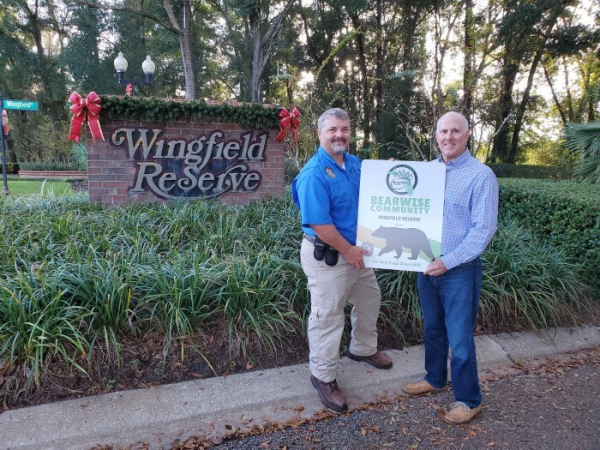
|
In central Florida, the Florida Fish and Wildlife Conservation Commission (FWC) is formally accepting the Wingfield North and Wingfield Reserve communities in Longwood into the BearWise Community Recognition Program. Both communities have met the six BearWise Basics, as well as passed ordinances requiring trash be kept secure from bears.
The Wingfield North subdivision was the site of an incident where a bear severely injured a resident in December 2013. The community responded by working with the FWC on actions to address human-bear conflicts. The homeowner’s association board took immediate steps to draft, implement and enforce a new set of HOA rules requiring all residents to secure garbage and other attractants from bears and other wildlife. As a result of the new covenants approved in 2014, bear activity dropped within two months. Due to its proximity to the Wekiva River Basin, bears still travel through the neighborhood but are no longer lingering in the area. Wingfield North has worked with the FWC to encourage other HOAs in the area to help them become BearWise. “It’s easy enough for communities to adopt BearWise rules and for owners to follow them but for most people the cost of bear-resistant trash cans presents a potentially significant obstacle. Unsecured trash is one of the greatest bear attractants and it is important that it be addressed as part of any BearWise effort,” said Gary Kaleita, former Wingfield North HOA Board Chairman. “Owners and communities should consider bear-resistant trash cans as an investment in the safety of both the community and the local bear population. If they prevent even a single injury or death from a bear encounter gone wrong, they are well worth the cost.”
Wingfield Reserve is a residential subdivision characterized by native canopy trees on relatively large residential lots. Given the dominance of large mature oaks and other native landscaping, the community provides ideal habitat for bears. Out of concern for the health and safety of residents and protection of properties, as well as a desire to live in harmony near a relatively high bear population, the HOA board incorporated BearWise components into their HOA covenants in 2016. These covenants included the purchase of bear-resistant trash cans for every residence, along with specific provisions for managing human waste; installing signs identifying the community as BearWise; and restricting the availability of other potential bear attractants, such as pet food and birdseed. “In general, Wingfield Reserve residents have embraced the BearWise program, resulting in a reduction in human-bear conflicts even though bears are still frequently observed in the community,” said Dr. Jay Exum, former HOA board member. “As a result, our neighborhood serves as a compatible habitat buffer to conservation lands associated with the Wekiva River and residents are less likely to have interactions with bears that would jeopardize human safety or result in property damage.”
It is important that individuals, communities and businesses proactively work together to prevent conflicts from occurring in the first place. Prevention benefits people and bears in the long run. To learn more about becoming a BearWise community, visit BearWise.org. More information about how the FWC manages human-bear conflicts is at MyFWC.com/Bear.
Increasing development and growing human and black bear populations have resulted in more interactions between bears and people. As the human footprint continues to expand into bear habitat, there is a growing need for people to take actions to avoid human-bear conflicts. Recognizing this need, wildlife agencies throughout the southeast have been working together to develop a strategy for educating the public on best practices to coexist with black bears. In 2018, the 15 member states of the Southeastern Association of Fish and Wildlife Agencies launched BearWise®.
BearWise is a regional outreach effort to provide science-based resources and communicate consistent and effective messaging about actions people can take to keep bears wild and people safe. Securing attractants, such as garbage and bird feeders, is the most effective and long-term solution to preventing and resolving human-bear conflicts. As such, some states have adopted formal BearWise Community Recognition Programs to expand beyond individual actions to reduce conflicts. Communities and businesses in North Carolina, Florida and Tennessee are making the commitment to be BearWise, resulting in positive impacts on people and bears.